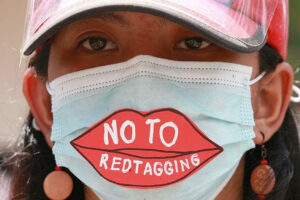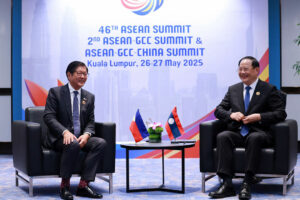A GLOBAL human rights coalition had observed 577 cases of red-tagging across the country ahead of the May 12 Philippine midterm elections, according to the International Coalition for Human Rights in the Philippines (ICHRP)’s International Observer Mission (IOM).
“This level of systematic red-tagging is not only a violation of human rights, it’s a coordinated effort to intimidate and discredit democratic actors,” IOM Commissioner Colleen Moore said in a statement at the weekend.
Red-tagging, which involves accusing an individual or organization of sympathizing with communism, is prominently used against opposition figures in the Philippines.
The group said that victims of red-tagging include candidates along with their campaign staff, local organizers, and supporters. Red-tagging also targets progressive candidates, party-list groups, poll workers, and even the Commission in Elections (Comelec).
“Observers report a flood of red-tagging materials: flyers, leaflets, and posters falsely linking individuals and groups to the armed insurgency are being distributed in communities and plastered on walls near campaign venues,” the group said.
The international observers also logged 48 cases of threats, harassment, and intimidation in areas including Northern Luzon, Southern Luzon, and Northern Mindanao.
IOM said that there were 62 incidents of election-related violence recorded from Jan. 12 to April 28, citing government data. Of which, 35 reported incidents were confirmed to be politically motivated.
It added that there have been “alarming trends of armed intimidation and even killings,” seen in the Cordillera Administrative Region, Bangsamoro Autonomous Region in Muslim Mindanao, and Calabarzon.
The IOM also reported that vote buying activities have surged in recent weeks with 176 cases of vote buying incidents logged within election hotspots.
The election observers said that payments ranged from P150 to P5,000 per voter, with most of the violators traced to entrenched political dynasties.
The IOM said that their observers have independently confirmed the widespread use of cash and goods in exchange for votes, especially in rural and high-poverty areas.
Under Article 12 of the Omnibus Election Code, vote-buying and vote-selling are punishable by imprisonment of not less than one year but not more than six years.
“Our mission is ongoing, but what we have observed so far is deeply concerning.” “The red-tagging of candidates, widespread vote-buying, and political killings are serious violations that threaten the integrity of the electoral process and the safety of our communities,” Mr. Moore said.
He said that the group remains “gravely concerned about the reported number of red-tagging, vote-buying and especially killings” in the Philippines. — Adrian H. Halili

















